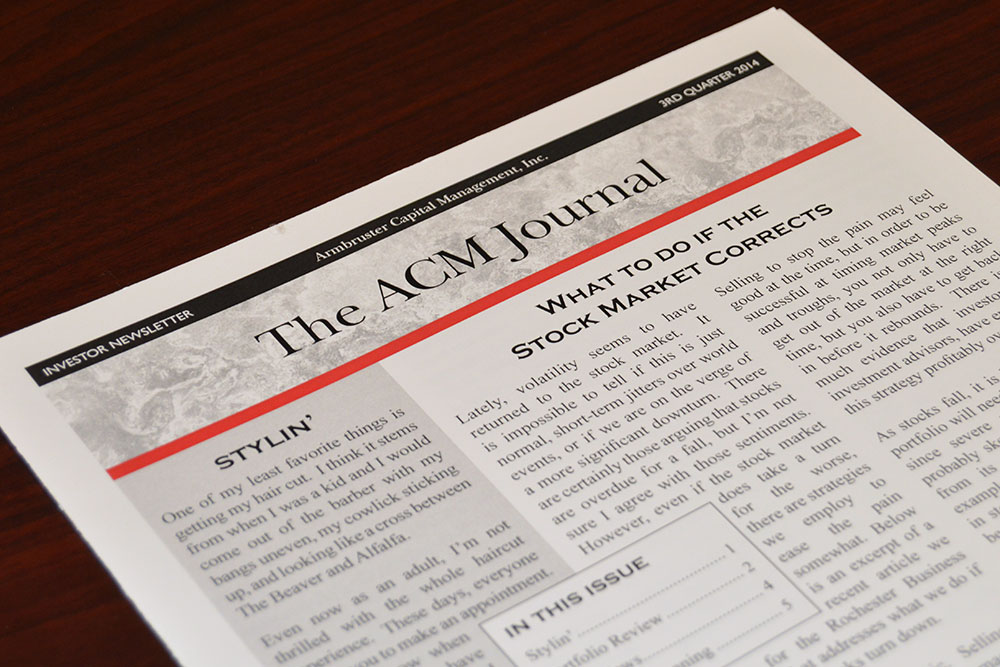Portfolio Review
Investment returns in the third quarter were strong and rewarded risk taking. Looking at the U.S. stock market, smaller-cap stocks outperformed large-cap stocks, and value stocks generally outperformed growth stocks. Most often, this sort of risk taking occurs during periods of market certainty. If investors feel good about the market, they are more likely to shift money to risky sectors of the market in order to earn higher returns. It is somewhat surprising that riskier market sectors would outperform now, given the uncertainty around the timing of an interest rate hike by the Fed, the upcoming election, and generally poor corporate earnings results. However, inflation is tame, interest rates are low, and the economy is still growing. Our stock portfolios tend to be

It is somewhat surprising that riskier market sectors would outperform now, given the uncertainty around the timing of an interest rate hike by the Fed, the upcoming election, and generally poor corporate earnings results. However, inflation is tame, interest rates are low, and the economy is still growing. Our stock portfolios tend to be risk seeking, so such an environment is good for our investment approach. While diversification and risk control are obviously important, we tilt our stock portfolios toward market segments that should earn higher returns over time. It doesn’t always work out, but the environment this year has been constructive. Increased risk taking could be seen within industry sectors as well. Technology stocks earned over 12% in the quarter, while more staid industries like utilities and real estate lost money. This is a change, as the higher-yielding utility and real estate industries had been star stock market performers earlier this year. Investors have been
Our stock portfolios tend to be risk seeking, so such an environment is good for our investment approach. While diversification and risk control are obviously important, we tilt our stock portfolios toward market segments that should earn higher returns over time. It doesn’t always work out, but the environment this year has been constructive. Increased risk taking could be seen within industry sectors as well. Technology stocks earned over 12% in the quarter, while more staid industries like utilities and real estate lost money. This is a change, as the higher-yielding utility and real estate industries had been star stock market performers earlier this year. Investors have been
Increased risk taking could be seen within industry sectors as well. Technology stocks earned over 12% in the quarter, while more staid industries like utilities and real estate lost money. This is a change, as the higher-yielding utility and real estate industries had been star stock market performers earlier this year. Investors have been yield hungry the past several years, driving up the shares of any investment with a significant yield. Low bond yields have driven even risk-averse investors toward stocks offering high yields. In my view, this just drives up risk and tax liability, but many investors do not seem to care. With valuations on higher-yielding investments reaching historic levels, I would not be surprised if the shift we saw in the third quarter is the start of a trend rather than a short-term blip. Particularly if the Fed decides to raise interest rates later this year, higher yielding investments could experience significant losses.
International Rebound
As risk appetites increased, international stocks have performed well recently. Developed markets generally outperformed U.S. stocks in the quarter, and made up some of the lost ground from earlier in the year. Continuing uncertainty over Brexit and sluggish economic growth in much of Europe are still concerns for the foreseeable future.
The emerging markets continued to be the best performing part of the capital markets both for the third quarter and the year-to-date period. Emerging market stocks have performed awfully the past few years, so they are overdue for a rebound. Very low stock market valuations have been enough to entice investors back despite some notable headwinds. Rising interest rates in the U.S. are typically bad for emerging markets, and continued strength in the U.S. dollar is also problematic. Nevertheless, the promise of stronger economic growth offered up at relatively cheap valuations has been…
To Download the rest of the article and the complete 2016 Q3 Newsletter please click below.

